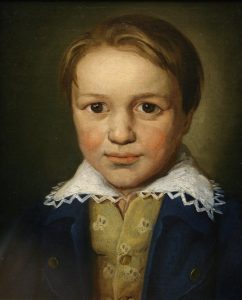
The year 2020 will mark our adored Louis van Beethoven’s 250th birthday. As discussed in Dr. Bob Prescribes on July 23, among my contributions to the coming year-of-living-Beethoven hoopla will be a series of posts exploring some of Beethoven’s lesser-known works and/or performances we should all know about. On July 23, the object of our affection was Beethoven’s magnificent Mass in C of 1807. Today we turn to Beethoven’s Piano Quartet in C Major, WoO 36, No. 3 of 1785. (“WoO” does not signify a fist-pumped expression of approbation: “woo, WOO!”, but rather, “Werke ohne Opuszahl”, a “work without opus number.” Werke ohne Opuszahl is a catalog published in 1955 that lists most the works by Beethoven that did not receive an opus number or that survived only in fragmentary form.)
Beethoven composed the three piano quartets of “WoO 36” when he was but a wee shaver of 14. What makes the third of these piano quartets super-special is that despite its obvious debt to Mozart, it is the first work by Beethoven that sounds like Beethoven. For this we have one person to thank, the single person who allowed Beethoven to become “Beethoven”: his principal music teacher, Christian Gottlob Neefe (pronounced NAY-feh).
Beethoven’s music education initially got off to a very bad start.
When Beethoven’s father Johann van Beethoven began giving little Ludwig music lessons at the age of four or five it quickly became apparent that the young fella was supremely gifted. After a lifetime of mediocrity, frustration and failure, Johann van Beethoven must have felt that his luck had finally turned; as if he had hit the mother lode; discovered Texas tea bubbling up in the backyard; his brain went cha-ching and ducat signs appeared in his glazed eyes. Because when Beethoven was 5 years old, the legendary Wolfgang Mozart was still a teenager, and the fame and fortune Mozart had generated as a child prodigy were still current events.
Johann van Beethoven believed that he was destined to be the “next” Leopold Mozart: a father whose music instruction would provide his son the means to heap fame, fortune, and social standing at his feet. But unlike Mozart’s father Leopold, Johann van Beethoven’s own musical abilities and teaching methods were completely inadequate to the task. Johann was pitiless and brutal in his attempts to beat his son Ludwig into a musical prodigy that could rival Mozart. Johann van Beethoven failed to make his son a performing prodigy to rival Mozart. We would observe the obvious: there could be only one Mozart, and Beethoven’s particular skill set – astonishing though it was – was quite different from Mozart’s and required time to mature. What Johann van Beethoven did succeed in doing was make his son Ludwig reject him, and to likewise reject – for the rest of his life – anything or anyone that he might perceive as being an authority figure.
The Pulitzer Prize and the National Book Award winning historian, biographer and concert-level pianist Edmund Morris sums up Johann van Beethoven’s teaching “method”:
“Neighbors of the Beethoven’s recall seeing a small boy ‘standing in front of the clavier and weeping.’ He was so short he had to climb a footstool to reach the keys. If he hesitated, his father beat him. When he was allowed off, it was only to have a violin thrust into his hands, or musical theory drummed into his head. There were few days when he was not flogged or locked up in the cellar. Johann also deprived him of sleep, waking him at midnight for more hours of practice.”
The child Beethoven’s response to his treatment was all too predictable. He withdrew into the sort of hard, emotional shell often created by survivors. He became a loner, an emotional recluse with few if any friends; he took no responsibility for his physical condition and appeared unwashed and shabby; he communicated in monosyllables. He walked leaning forward, as if he were always in a hurry to vacate wherever he was. His relatively dark complexion even made him look like the “outsider” he felt himself to be; his neighbors and classmates nicknamed him der Spagnol – “the Spaniard” – because of his complexion.
By the time Ludwig was 7, Johann van Beethoven had nothing left in his meagre musical arsenal to teach his son. So while he remained the “enforcer”, Johann began to cajole his various musical acquaintances into teaching his son. But none of these “teachers” lasted for very long and Beethoven’s musical education lacked a single, guiding hand. That changed – for which we all must thank whatever deity or source of mystical power we might believe in – in the early fall of 1781, when Johann van Beethoven pulled his still 10-year-old son Ludwig out of school for good and apprenticed him to a Lutheran-born organist, composer, and conductor named Christian Gottlob Neefe (1748-1798).
